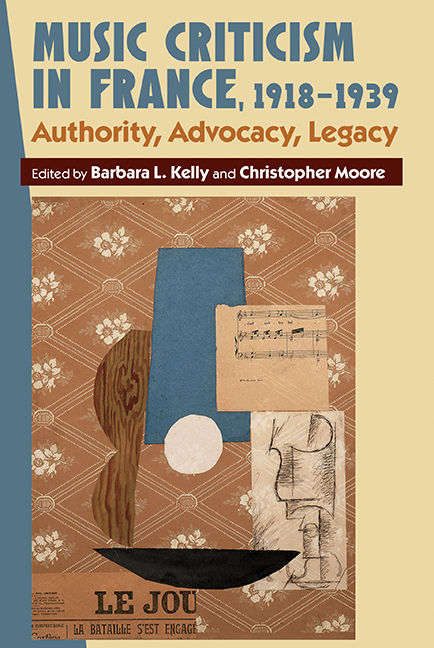Book contents
- Frontmatter
- Contents
- List of Figures
- List of Tables
- List of Contributors
- Acknowledgements
- Introduction: The Role of Criticism in Interwar Musical Culture
- 1 Music Criticism and Aesthetics During the Interwar Period: Fewer Crimes and More Punishments
- 2 Nostalgia and Violence in the Music Criticism of L'Action française
- 3 Charles Koechlin: The Figure of the Expert
- 4 Bleu-horizon Politics and Music for Radio Listeners: L'Initiation à la musique (1935)
- 5 Common Canon, Conflicting Ideologies: Music Criticism in Performance in Interwar France
- 6 Arthur Honegger: Music Critic for Musique et Théâtre (1925–1926)
- 7 A Woman's Critical Voice: Nadia Boulanger and Le Monde musical, 1919–1923
- 8 From a Foreign Correspondent: The Parisian Chronicles of Alejo Carpentier
- 9 Debussy's ‘Reputational Entrepreneurs’: Vuillermoz, Koechlin, Laloy and Vallas
- 10 The Legacy of War: Conceptualising Wartime Musical Life in the Post-War Musical Press, 1919–1920
- 11 Satie, Relâche and the Critics: Controversies and Legacy
- 12 Creating a Canon: émile Vuillermoz's Musiques d'aujourd'hui and French Musical Modernity
- Selected Bibliography
- Index
5 - Common Canon, Conflicting Ideologies: Music Criticism in Performance in Interwar France
Published online by Cambridge University Press: 17 July 2019
- Frontmatter
- Contents
- List of Figures
- List of Tables
- List of Contributors
- Acknowledgements
- Introduction: The Role of Criticism in Interwar Musical Culture
- 1 Music Criticism and Aesthetics During the Interwar Period: Fewer Crimes and More Punishments
- 2 Nostalgia and Violence in the Music Criticism of L'Action française
- 3 Charles Koechlin: The Figure of the Expert
- 4 Bleu-horizon Politics and Music for Radio Listeners: L'Initiation à la musique (1935)
- 5 Common Canon, Conflicting Ideologies: Music Criticism in Performance in Interwar France
- 6 Arthur Honegger: Music Critic for Musique et Théâtre (1925–1926)
- 7 A Woman's Critical Voice: Nadia Boulanger and Le Monde musical, 1919–1923
- 8 From a Foreign Correspondent: The Parisian Chronicles of Alejo Carpentier
- 9 Debussy's ‘Reputational Entrepreneurs’: Vuillermoz, Koechlin, Laloy and Vallas
- 10 The Legacy of War: Conceptualising Wartime Musical Life in the Post-War Musical Press, 1919–1920
- 11 Satie, Relâche and the Critics: Controversies and Legacy
- 12 Creating a Canon: émile Vuillermoz's Musiques d'aujourd'hui and French Musical Modernity
- Selected Bibliography
- Index
Summary
Music criticism extended beyond written commentary in newspapers and journals in interwar France. This chapter examines the activities of critics as concert organisers. It focuses on two concert series after the Great War: the concerts of La Revue musicale, which were set up in Paris by the influential journal director, critic and musicologist, Henry Prunières (1886–1942); and the Petits concerts, which were established in Lyon in 1919 by the critic and musicologist Léon Vallas (1879–1956) and associated with his journal La Nouvelle Revue musicale. I show how criticism could be performed in the concert hall, alongside other forms of unwritten and written communication, such as pre-concert talks and lectures, as well as reviews, leader comments and features. To what degree did these sonic and oral forms support Prunières's and Vallas's central occupations as critics, musicologists and biographers? Recent studies of interwar criticism have revealed the considerable ideological differences between Prunières and Vallas, particularly over their efforts to remember Debussy. This chapter explores the extent to which these concert series and the repertoire they featured reflected the aesthetic and ideological orientations of their organisers. Both critics were committed to promoting a common canon of French music, which drew on music from the generations of Rameau and Couperin, on the one hand, and Debussy and Ravel, on the other.
Prunières was also determined to promote international contemporary music, which had been almost inaccessible during the Great War. While the two critics may have broadly agreed about the significance of upholding French music of the past, what contemporary and foreign music did they bring to life in their concerts? Finally, the chapter considers the extent to which these concerts provided yet another platform for these influential critics to persuade and educate their regional, national and international audiences.
Origins and Motivations for the Concert Series
Writing anonymously in Le Progrès (Lyon), Vallas announced the launch of the Petits concerts in 1919, indulging in some self-publicity.
A new musical organisation has just been established alongside [Georges Martin] Witkowski's Grands concerts; the official launch will take place in a month's time. It is a sort of federation of recently constituted artistic ensembles: a vocal quintet, a choral quintet, a string quintet, a wind quintet, and a trio of viols and harpsichord.
- Type
- Chapter
- Information
- Music Criticism in France, 1918–1939Authority, Advocacy, Legacy, pp. 121 - 150Publisher: Boydell & BrewerPrint publication year: 2018
- 1
- Cited by



